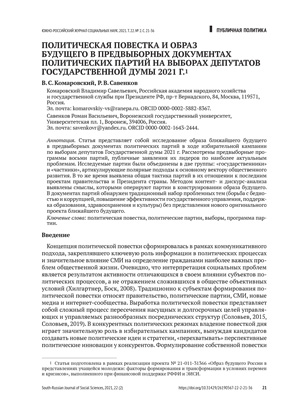Abstract
The article research of the image of the near future in the election documents of political parties during the election campaign for the elections of deputies to the State Duma in 2021. The election programs of eight parties, public speeches of their leaders on the most pressing issues are considered. The parties were combined into two groups: “statists” and “private traders”, articulating polar approaches to the main vector of social development. At the same time, the general tactics of the parties in their attitude to the latest projects of the government and the president of the country were revealed. The method of content and discourse analysis revealed the meanings that the parties use in constructing the image of the future. The documents of the parties revealed a traditional set of problematic topics (fighting poverty and corruption, improving the efficiency of public administration, supporting education, health care and culture) without presenting a new original project for the near future.
Keywords
Acknowledgements
The article was prepared within the framework of the implementation of the project No. 21-011-31366 “The image of the future of Russia in the ideas of student youth: factors of formation and transformation in the face of changes and crises”, carried out with the financial support of RFFR and EISR.
References
- Anderson, Ch., Beramendi, P. (2012). Left Parties, Poor Voters, and Electoral Participation in Advanced Industrial Societies. Comparative Political Studies, 45(6), 714–746. DOI: 10.1177/0010414011427880.
- Gel’man, V. Ya. (2014). Trudnoe vozrozhdenie rossiyskoy oppozicii [Difficult Revival of the Russian Opposition]. Pro et Contra [Pro et Contra], 1–2, 106–123.
- Glukhova, A. V. (Ed). (2020). Vnutripoliticheskaya povestka dnya kak faktor edinstva sovremennoy Rossii [Internal Political Agenda as a Factor of Unity of Modern Russia]. Voronezh: “Nauchnaya kniga”.
- Golosov, G.V. (2019). Chestnost’ vyborov i yavka izbirateley v usloviyakh avtoritarizma [Fairness of Elections and Voter Turnout under Authoritarianism] Politicheskaya nauka [Political Science], 1, 67–89.
- Khilgartner, S., Bosk, Ch. L. (2008). Rost i upadok sotsialnykh problem: kontseptsiya publichnykh aren [Growth and Decline of Social Problems: The Concept of Public Arenas]. Social’naya real’nost’ [Social Reality], 2, 73–94.
- Il’in, M. V. (2002). Politicheskiy diskurs kak predmet analiza [Political Discourse as a Subject of Analysis]. Politicheskaya nauka [Political Science], 3, 4–20.
- Ionova, A. O. (2016). Sovremennye podhody k analizu politicheskogo diskursa [Contemporary Approaches to the Analysis of Political Discourse]. Politicheskaya nauka [Political Science], 3, 236–259.
- Komarovskiy, V. S. (2021). Obraz budushchego Rossii glazami molodezhi [The Image of the Future of Russia through the Eyes of Youth]. Moskva: Aspekt-Press.
- Korgunyuk, Yu. G. (2019). Koncepciya razmezhevaniy i teoriya problemnykh izmereniy: tochki peresecheniya [Cleavage Theory and Theory of Issue Dimensions: Cross-Points]. Polis. Politicheskie issledovaniya [Polis. Political Studies], 6, 95–112. DOI: https://doi.org/10.17976/jpps/2019.06.08.
- Malinova, O. Yu. (2007). Ideologicheskiy plyuralizm i transformaciya publichnoj sfery v postsovetskoj Rossii [Ideological Pluralism and the Transformation of the Public Sphere in Post-Soviet Russia]. Polis. Politicheskie issledovaniya [Polis. Political Studies], 1, 6–21.
- Marianne, V. Y., Luiza, D. (2008). Diskurs-analiz. Teoriya i metod [Discourse Analysis. Theory and Method]. Har’kov: Izd.-vo “Gumanitarnyy Tsentr”.
- Nyuman, L. (1998). Neoprosnye metody issledovaniya [Nonreactive Research and Available Data]. Sociologicheskie issledovaniya [Sociological Studies], 6, 119–129.
- Schmitt, K. (2016). Ponyatie politicheskogo [The Consept of the Political]. Sankt-Peterburg: “Nauka”.
- Semenova, A. V., Korsunskaya, M. V. (2010). Kontent-analiz SMI: Problemy i opyt primeneniya [Media Content Analysis: Problems and Experience in Application]. Moskva: Izd-vo Instituta sociologii RAN.
- Smorgunov, L. V., Morozova, E. V., Kol’ba, A. I. (Eds). (2015). Sovremennaya politicheskaya real’nost’ i gosudarstvo: slozhnye metody issledovaniy [Modern Political Reality and The State: Complex Research Methods]. Krasnodar: Kubanskiy gosudarstvennyy universitet.
- Solovyov, A. I. (2015). Gosudarstvo kak prostranstvo prinyatiya resheniy [The State as a Decision-Making Space]. In Smorgunov L. V. Rossiyskaya politicheskaya nauka: Idei, koncepcii, metody [Russian Political Science: Ideas, Concepts, Methods] (pp. 121–140). Moskva: Izdatel’stvo “Aspekt Press”.
- Solovyov, A. I. (2019). Politicheskaya povestka pravitel’stva, ili zachem gosudarstvu obshchestvo [Political Agenda of the Government, or Why the State Needs the Society]. Polis. Politicheskie issledovaniya [Polis. Political Studies], 4, 8–25.
- Timofeeva, L. N. (2020). Publichnaya kritika kak sredstvo preduprezhdeniya nasiliya v obshchestve [Public Criticism as a Prevention of Violence in Society]. Politicheskaya nauka [Political Science], 3, 114–146. DOI: doi.org/10.31249/poln/2020.03.06.
- Timofeeva, L. N. (Ed.). (2012). Politicheskaya kommunikativistika: teoriya, metodologiya i praktika [Political Communication Studies: Theory, Methodology and Practice]. Moskva: Rossiyskaya associatsiya politicheskoy nauki (RAPN), Rossiyskaya politicheskaya enciklopediya (ROSSPEN).
- Tolpygina, O. A. (2014). Ideyno-politicheskiye kontury partiynogo landshafta sovremennoy Rossii [Ideological and Political Contours of the Party Landscape of Modern Russia]. Moskva: INION RAN.
- Tolpygina, O. A. (2015). Transformatsiya ideologicheskoy funktsii politicheskikh partiy v sovremennoy Rossii [Transformation of the Ideological Function of Political Parties in Modern Russia]. Politicheskaya nauka [Political Science], 1, 157–171.
- Tolpygina, O. A. (2017). Politicheskiye partii “v poiskakh smysla”: spetsifika ideologicheskogo vzaimodeystviya partiy s izbiratelyami [Political Parties “in the Search for Meaning”: Specifics of Party Ideological Interactions with Voters]. Politicheskaya nauka [Political Science], 1, 204–221.
- Trenin, D. (2021). Novyy balans sil: Rossiya v poiskakh vneshnepoliticheskogo ravnovesiya [A New Balance of Power: Russia in Search of Foreign Policy Equilibrium]. Moskva: Al’pina.
- Yakovleva L. I. (2011). Diskurs-analiz kak odin iz srezov sotsial’no-filosofskogo, kul’turologicheskogo i lingvisticheskogo issledovaniya [Discourse Analysis as a Subset of Socio-Philosophical, Cultural and Linguistic Research]. Filosofskie opyty. Globalizatsiya, kommunikatsiya, identifikatsiya [Philosophical Experiments. Globalization, Communication, Identity], 4, 22–66.
- Yavlinskiy, G. A. (2021). Vtoroye iyulya. O zavershenii proigrannoy epokhi i perspektivakh [July 2nd. About the End of the Lost Era and the Prospects]. Moskva: RODP “YABLOKO”.
 Русский
Русский


